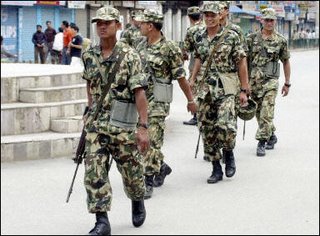Nepal's Army Accepts New Government

Reuters
May 29, 2006
KATMANDU, Nepal, May 28 (Reuters) — Nepal's army will accept the authority of the new government, the chief of the army said Sunday.
In his first comments since Parliament curbed King Gyanendra's powers, including his control of the armed forces, the army chief, Gen. Pyar Jung Thapa, said troops were committed to democracy in Nepal.
King Gyanendra gave in to violent protests in April, returning power to political parties and reinstating Parliament, which he had dissolved in 2002.
"The Nepalese Army is committed to follow the directives of the government," an army statement quoted General Thapa as saying in an address to trainees at the army's Command and Staff College.
Parliament moved fast this month to curb the king's powers, take control of the army and strip the king of his title of supreme commander in chief. Parliament also changed the name of the armed forces from the Royal Nepalese Army to simply the Nepalese Army.
General Thapa said the 90,000-member army was engaged in "consolidating multiparty democracy and promoting national prosperity by maintaining peace."
Until a month ago, the army was pitted against Maoist rebels, who had backed the political parties in their campaign against the king.
On Friday, the government and rebels held their first meeting since 2003, agreeing to a 25-point code of conduct, including a commitment to end provocations and stop using arms to intimidate people.
May 29, 2006
KATMANDU, Nepal, May 28 (Reuters) — Nepal's army will accept the authority of the new government, the chief of the army said Sunday.
In his first comments since Parliament curbed King Gyanendra's powers, including his control of the armed forces, the army chief, Gen. Pyar Jung Thapa, said troops were committed to democracy in Nepal.
King Gyanendra gave in to violent protests in April, returning power to political parties and reinstating Parliament, which he had dissolved in 2002.
"The Nepalese Army is committed to follow the directives of the government," an army statement quoted General Thapa as saying in an address to trainees at the army's Command and Staff College.
Parliament moved fast this month to curb the king's powers, take control of the army and strip the king of his title of supreme commander in chief. Parliament also changed the name of the armed forces from the Royal Nepalese Army to simply the Nepalese Army.
General Thapa said the 90,000-member army was engaged in "consolidating multiparty democracy and promoting national prosperity by maintaining peace."
Until a month ago, the army was pitted against Maoist rebels, who had backed the political parties in their campaign against the king.
On Friday, the government and rebels held their first meeting since 2003, agreeing to a 25-point code of conduct, including a commitment to end provocations and stop using arms to intimidate people.